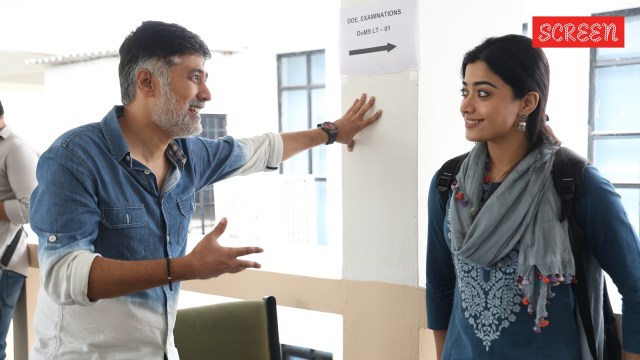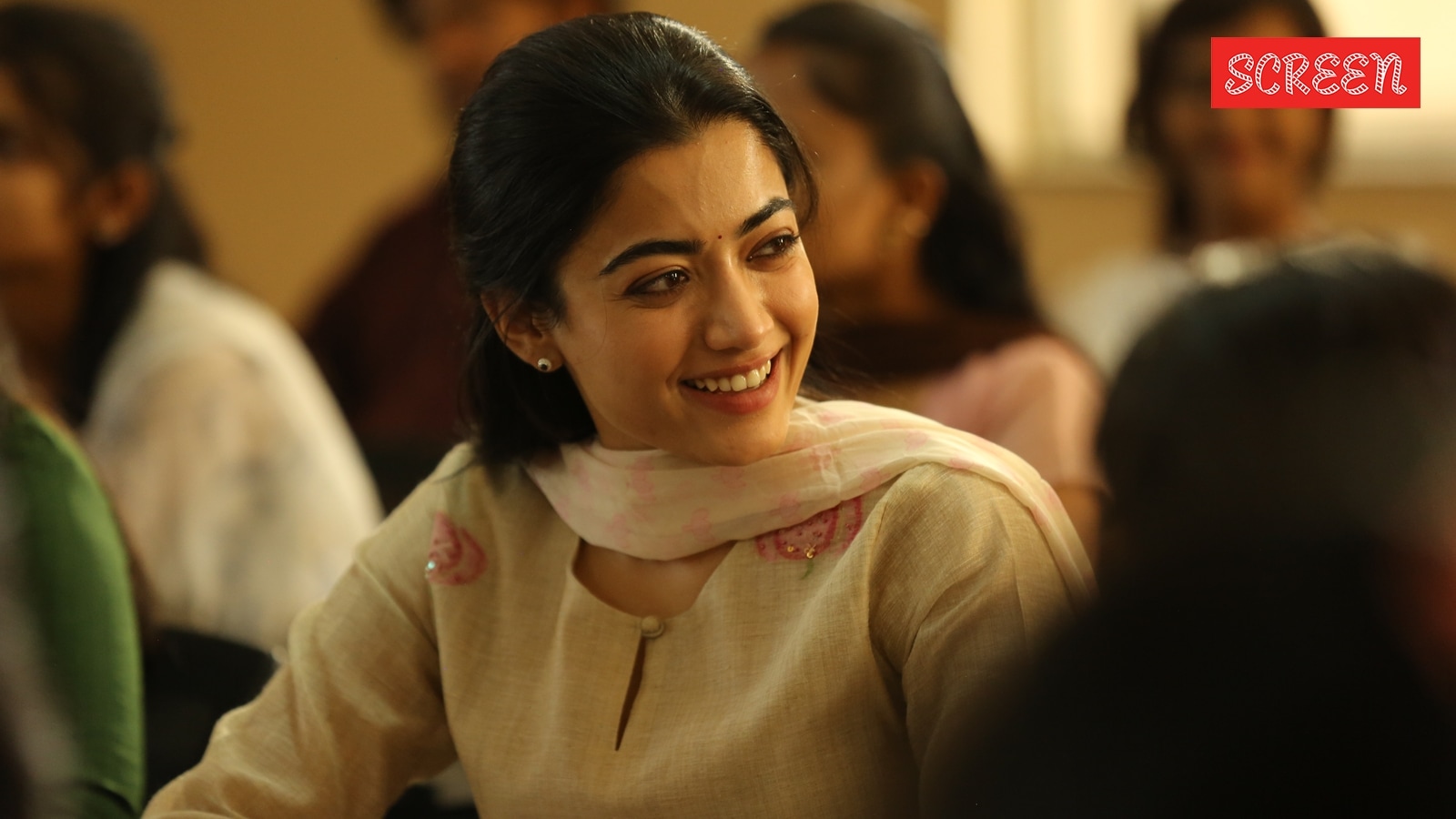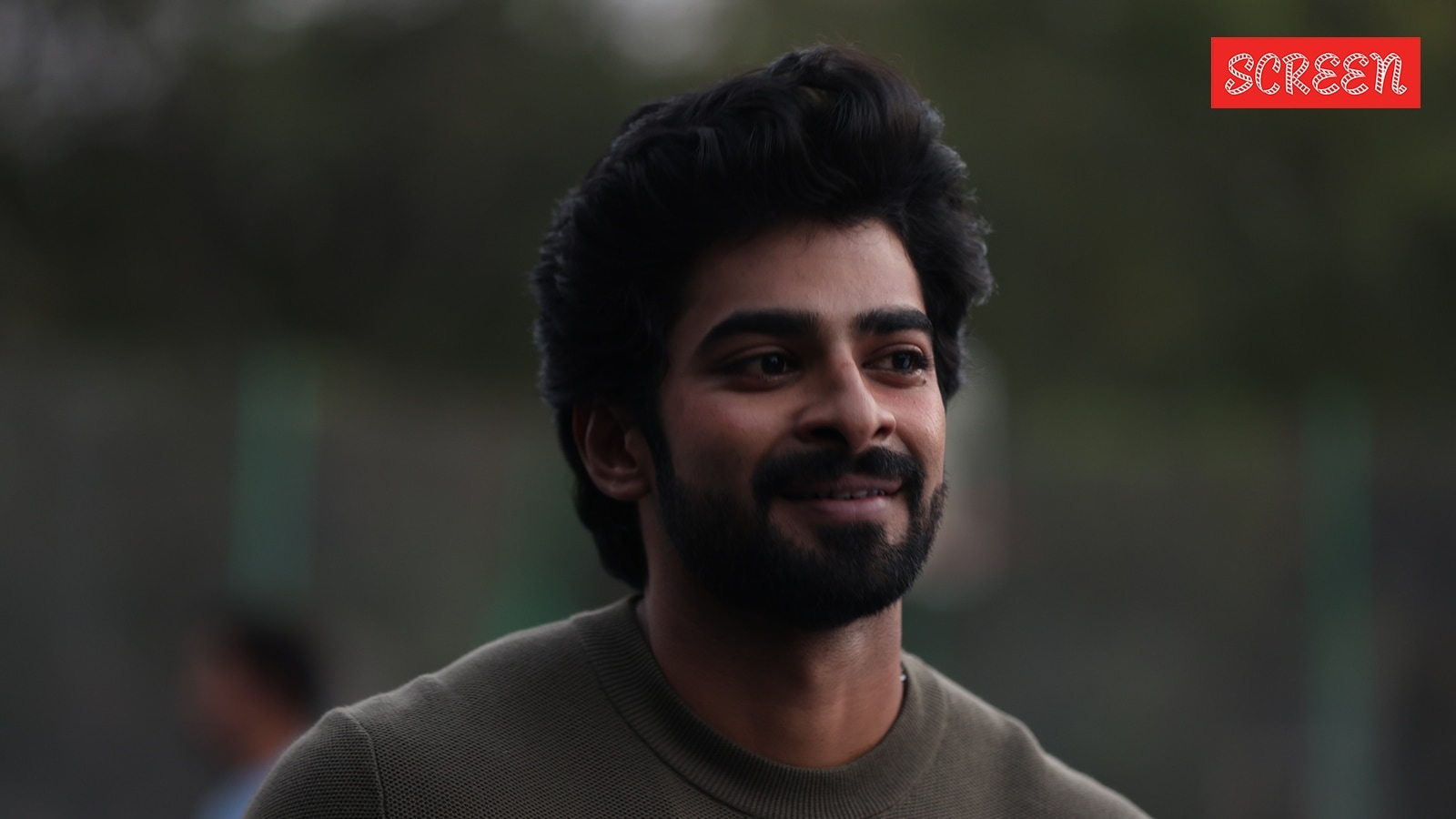Click here to follow Screen Digital on YouTube and stay updated with the latest from the world of cinema.
Rahul Ravindran on casting Rashmika Mandanna in The Girlfriend: ‘I wanted an actor with very transparent eyes to play Bhooma’
In an interview with SCREEN, The Girlfriend director Rahul Ravindran talks about working with an A-lister like Rashmika Mandanna, feeling a personal need to share this story, and the empathetic foundation of his writing.
 Rahul Ravindran and Rashmika Mandanna on the sets of The Girlfriend.
Rahul Ravindran and Rashmika Mandanna on the sets of The Girlfriend.There’s something very endearingly organic about Rahul Ravindran’s latest film, The Girlfriend, from its unembellished and unflinching portrayal of modern love and relationships to central performances that feel authentic and refreshing at once.
Rahul Ravindran’s gaze as a writer and director upends norms that have long defined mainstream Indian cinema’s portrayal of female autonomy and its glorification of coercive masculinity. The film anchors itself in a delicate yet stirring performance from Rashmika Mandanna – one that has rightly earned wide praise – but the real force of it all lies beyond the usual contours of public or critical opinion; The Girlfriend elicits a sense of catharsis and introspection that now seems pertinent to the Indian viewer, more than ever.
SCREEN caught up with the filmmaker to discuss the various aspects of his film, ranging from working with an A-lister like Rashmika, feeling a personal need to share this story, and the empathetic foundation of his writing. Edited excerpts:
What have the past few days been like for you?
It’s been a whirlwind. On the one hand, it’s been an outpour of love and affection from the audience. There’s a realization that women and girls are so starved of the content that resonates with them. So, when something like this comes along, they take it upon their own shoulders, champion it and make sure the film does well. It’s heartwarming to see so many women turn up at the theatres, but what’s even more heartwarming is to see the men clap and cheer wildly for Bhooma in the film.
On the other hand, a number of men and women, who have been at the receiving end of unhealthy relationships, have reached out and shared their stories (with me). Some of them are really heartbreaking, disturbing and difficult to digest, so it has been a mix of extreme highs peppered with some lows. I always thought we were making a film that would start conversations that aren’t generally had, something that’d give words to silences that many bear as a burden all their lives. I didn’t expect it to have this impact, but Rashmika saw it happening from the beginning. ‘I don’t know how you were able to understand these things and write them as a man, but I don’t think you understand how women are going to react to this film,’ she’d say to me.
What do you suppose resonated with Rashmika so much?
Rashmika grew up in hostels from a very young age. She told me that she connected with the fact that when she wasn’t yet an adult and didn’t have a fully-formed personality, she had to grapple with so many things in a new environment. For her, it was about being pushed into a current and then going with the flow, without really having a say about what’s going on in the world. One aspect of Bhooma that really hit home for Rashmika was her inability to express her feelings, and that is why I feel she was able to internalise the performance so well.
 Rashmika Mandanna plays Bhooma in The Girlfriend.
Rashmika Mandanna plays Bhooma in The Girlfriend.
And why did you wish to work with her specifically?
I wanted an actor with very transparent eyes to play Bhooma; you can change almost everything else about an actor, but you can’t change the eyes. I didn’t have any particular actor in mind when I was writing the film, but I knew that I needed an actor who, when I put a close-up on her, would give the audience a full view of what’s going on inside her. I knew right away that Rashmika had that (about her). As a filmmaker, you want to tell your stories, but you also want to reach out to as many people as possible. That’s happening today, not just because of her muscle or popularity as an A-lister, but also because of her exceptionally intuitive, lived-in performance. It’d have been a heartbreak for us if she hadn’t said yes (to working on the film), but she did, and that’s helping in taking the film to a wider audience.
Would you say this story stemmed from a need you personally felt?
About a decade ago, I was observing this movement in South Indian cinema, which was glorifying the pain of a ‘soup boy’. I was observing the kind of whistles, claps and general adulation it was eliciting, and it was around that point that I decided I wanted to make a film where I just turned the camera gently and framed the other party. It was the hope to make a film that can make people empathise with the other party as well, and make them uncomfortable rather than whistle, clap and hoot. The story began to develop because of the fact that the other side wasn’t getting any representation at that point. It’s heartwarming today that, slowly but steadily, films are getting made around the world with this perspective in mind.
It’s fascinating to note that The Girlfriend is told entirely from the perspective of an indecisive protagonist, whereas mainstream Telugu cinema almost always prefers a clear-headed, very decisive kind of hero. Was it difficult to construct a narrative in this novel way?
My protagonist in the first half is largely passive in that there are circumstances and characters acting upon her, and almost never the other way around. It’s like she’s thrown into a current and is just getting pushed along. I’d constantly tell Rashmika that the greatest credit to her performance is that the first half of the film is largely a collection of reaction shots of a person who barely has any control over her own life. So, yes, creating a narrative through a character like Bhooma was tricky. But, again, I didn’t have any second thoughts about approaching it this way because the nature of the story I was telling, and the structure of the screenplay itself, demanded that. Once I understood that as a writer, I knew I had to stick to my guns and make an honest film.
Also Read | The Girlfriend review: Rashmika Mandanna elevates the film with grace and vulnerability
Were you always sure of using a college and hostels as your setting?
It was always my only pick because I didn’t have other choices to begin with. Now that you have asked me this question, I wonder why that was the case, but I suppose I knew instinctively all along that I was talking about young adults here. The whole point was to resonate with the Vikrams out there who aren’t teenagers anymore, but aren’t adults yet either – and where do such Vikrams have the most autonomy except in a hostel environment, where they, as well as the other party (Bhooma, in this case), are free from the clutches of their parents. There’s complete autonomy here to completely take over the other party’s life, whereas in the outside world, you’re still fighting for the girl’s bandwidth and time with her parents and family.
Simultaneously, it was very important to give people glimpses of how Bhooma can blossom if she is outside of Vikram’s sphere of influence. It had to be an environment where she had some sort of agency as a person to control her life, and yet, she’s not able to: and that couldn’t have happened if she were still living with her parents.
Was there any fear of letting a male gaze take over your writing? Did it need a female perspective at some point?
I am a very self-aware writer. I won’t claim to be a good writer or filmmaker – that’s up to people to judge and tell me – but I am very self-aware, and I understand the male gaze very intuitively. I’m pretty sure the male gaze will never creep into a film that I’m making, unless I’m exploring the nature of the male gaze by itself. But after I finished writing my first draft, I did send it to about 12-13 women who are friends in my life, just to understand if I’ve got the psyche and the psychology of Bhooma’s character right. Just to understand if it’s resonating with them or if it feels too alien, because it’s written by a man. A majority of them called me back very emotional and spoke about the nasty breakup stories that they have from their lives – and trust me, a lot of them were far worse than what I’ve shown in the film.
About 60-70% of them had one objection about a post-climax portion that was originally part of the first draft, involving a throwaway scene about Vikram finding redemption. They didn’t have an objection to the film itself, but there was a feeling of unfairness. They felt that although it is perfectly fine to lend him that redemptive arc, it was still important to take the time and space to show that he paid for what he did, and how he grew as a person and grew out of what he was. If that wasn’t to be the case, they asserted that the redemption didn’t have any space in Bhooma’s story just for the sake of it because it frustrated them to see a lot of the men who were unkind to them keep getting away with it, and they didn’t want to see that happen in this film as well. I am an optimistic filmmaker, and I care about the Vikrams as well, and I want a Vikram to go back home to reflect on what he did. But I paid heed to the feedback because there was a lot of authenticity to the rest of the writing, to how Bhooma, as well as Durga, were portrayed. That scene from the post-climax was later removed.
 Dheekshith Shetty plays Vikram in The Girlfriend.
Dheekshith Shetty plays Vikram in The Girlfriend.
Do you genuinely believe that someone like Vikram deserves another chance to redeem himself and get back on the right track?
As a writer, I don’t think I deserve the power to decide if he must get another chance or not. But still, I sure hope he does. I wrote the film with a lot of hope, and believe it or not, people find it weird when I say that I created Vikram with a lot of care and affection. I understand that Vikram was raised in a certain environment, and when he’s caught at a crossroads emotionally and mentally in the story, he’s going to behave the way he does. The whole idea of making this film was to encourage a few Vikrams of that age to go back home and reflect. Whether they change or not is not in my hands. Whether change is the right way to go about it or not depends on the exact case, but if I can get even five Vikrams sitting in the theatre to empathise with Bhooma, that would make my day. I can assure you now that the number is far higher than 5, because I have received several personal messages from young men who have not only reflected on themselves, but they have actually changed for the better.
Speaking of the post-climax, did you ever feel that Bhooma’s life shown in the snippet would seem idealistic or unattainable?
I show a girl who’s just gotten on with her life, right? She gets placed off campus, but she is not the CEO of some company straightaway. She buys her first car two years later, is clearly good at her job because of which she gets a promotion, starts travelling and so on – all these are very simple, attainable things. I also wanted to make sure that when it came to her book, I’m going to show that she has just begun writing it. There were initial suggestions from within the team to show her winning something like a Pulitzer Prize for her book, but I was very certain that that’s not the point I wanted to make. I’m not making a film about an incredible achiever people couldn’t relate to, but about an everyday girl who, at the end of it all, is within reach and whose success feels very achievable.
Now, if you let the post-climax portion be, I feel that it is the climax scene where I have intentionally played with this attainability factor. I knew I was pushing it with Bhooma’s monologue because, at the end of the day, it is a story of a hero who rises from her problems. Any girl watching would realise that she might not be able to do exactly that, but hopefully, that will give her the strength and the bravery to go at least half that distance, to at least stand up for herself and have a conversation. Little did I know that taking it that far would actually have an impact of a kind and make it a mass movie! I did not think I was writing or making a film that would get claps and whistles in the theatres.


- 01
- 02
- 03
- 04
- 05
































